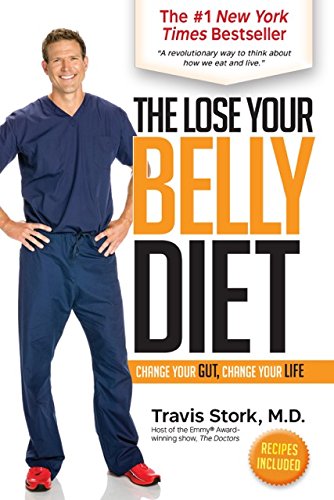Book Review: The Lose Your Belly Diet by Travis Stork, M.D.
Prior to reading this book, I had no idea the author was an E.R. physician. In that profession, Dr. Stork has seen what happens if you do NOT take care of your body. The poor folks he sees in the ER room "wish more than anything that they could turn back the clock and live a better, healthier life. They would give anything for a second chance. But many of them can’t. It is too late for them."
THE LOSE YOUR BELLY DIET is primarily focused on changing the food you eat--especially getting more fiber and a diversity of microbes into your diet. That is, it's not an exercise book or a set of short cuts to make you look slimmer. Rather, improving your appearance is actually a side benefit of the better diet. That is, you will naturally have a smaller belly when you incorporate the recommended changes.
The essence of the Lose Your Belly Diet is really just 5 things:
Enjoy probiotic foods every day.
Eat an abundance of Prebiotic Superstars
Pick a mix of proteins
Choose great grains
Embrace friendly fats
Dr. Stork emphasizes what he calls, "Buddies in Your Belly." These are the microbes in your gut. The doctor emphases the importance of getting a diverse population of microbes into our system: "Gut microbes play such a crucial role in our health that it’s kind of amazing that it’s taken so long for us to start giving them the attention they deserve"
In an era where we emphasize super-cleanliness and use of antibacterial lotions, it's important to take action to improve the diversity of our gut bacteria: "The good news is that we can take significant steps to repair our damaged guts." The doctor points out that increasing dietary fiber is a critical (and pretty easy) step.
Another big emphasis of THE LOSE YOUR BELLY DIET is getting more fiber into our diet. This is not a new idea of course, but it IS a well-supported idea: "Giant piles of research have shown that people who eat adequate fiber have a lower risk of various chronic health conditions, such as heart disease, obesity, diabetes, some kinds of cancer..."
I like the author's willingness to admit when the science is not quiteproven in some areas. I appreciate his humility: "Although we have learned so much lately, there are still many things we don’t know about gut bacteria and how best to support it. . . When we don’t know whether A is better than B or C, I’ll level with you and share whatever guidance is available to help you make choices that are best for you."
PART II suggests "Foods That Feed Your Gut." I thought one of the more sections was the "Dozen Easy Ways to Eat More Fiber." I learned several good dietary tactics that I had not thought of. Here are the ones that I found most helpful:
#4: In soups, chili , and pasta sauces, replace some meat with beans or lentil
#7: Choose fruits and vegetables that are highest in fiber. For example, raspberries contain much more fiber (8 grams per cup) than strawberries (3 grams per cup).
#8. Add beans, lentils , split peas, or seeds to your salads.
#10. Swap hummus for mayonnaise as a sandwich spread. Hummus provides you with protein as well as fiber.
As a result of reading this tips, I am changing the food I eat to try to emphasize more fiber and microbe diversity, as the doctor recommends. I confess I had no idea that raspberries had a lot of fiber compared to strawberries. That seems like a really simple change to do.
Another good way to enhance your gut microbe diversity is to eat probiotic foods, which are "teeming with helpful microbes, you introduce new guests to the microbe party in your gut." The author reminds the reader that yogurt is the "mother of all probiotic food." Kefir isanother good choice, because it has many different strains of bacteria, compared to yogurt. I did not know that.
Dr. Stork cites the well-known study showing that kids who grow up in "dirtier" environments are often healthier: "Kids who grow up in homes with dogs have lower rates of asthma, allergies, and eczema than kids without dogs. . . Kids who are raised on farms pick up a wide variety of microbes as they interact with animals." Although the research is not yet conclusive, it seems as though early exposure to microbes improves our immune system.
All in all, I found THE LOSE YOUR BELLY DIET to be a helpful, encouraging book. I didn't see any startling new findings, but there were a lot of practical tips I had not considered. Dr. Stork concludes with an encouraging note: "Make the most of your life by being active and fueling your body in a way that best supports you." Recalling what he sees in the E.R department, the doctor exhorts the reader to take action NOW. Change your diet, and the benefits will start right away.
I thought this quote sums up the book nicely:
"Don’t be the person in the ER whose last moments are filled with nothing but regret. Commit to living an active, healthy life."
Advance Review Copy courtesy of the publisher.









